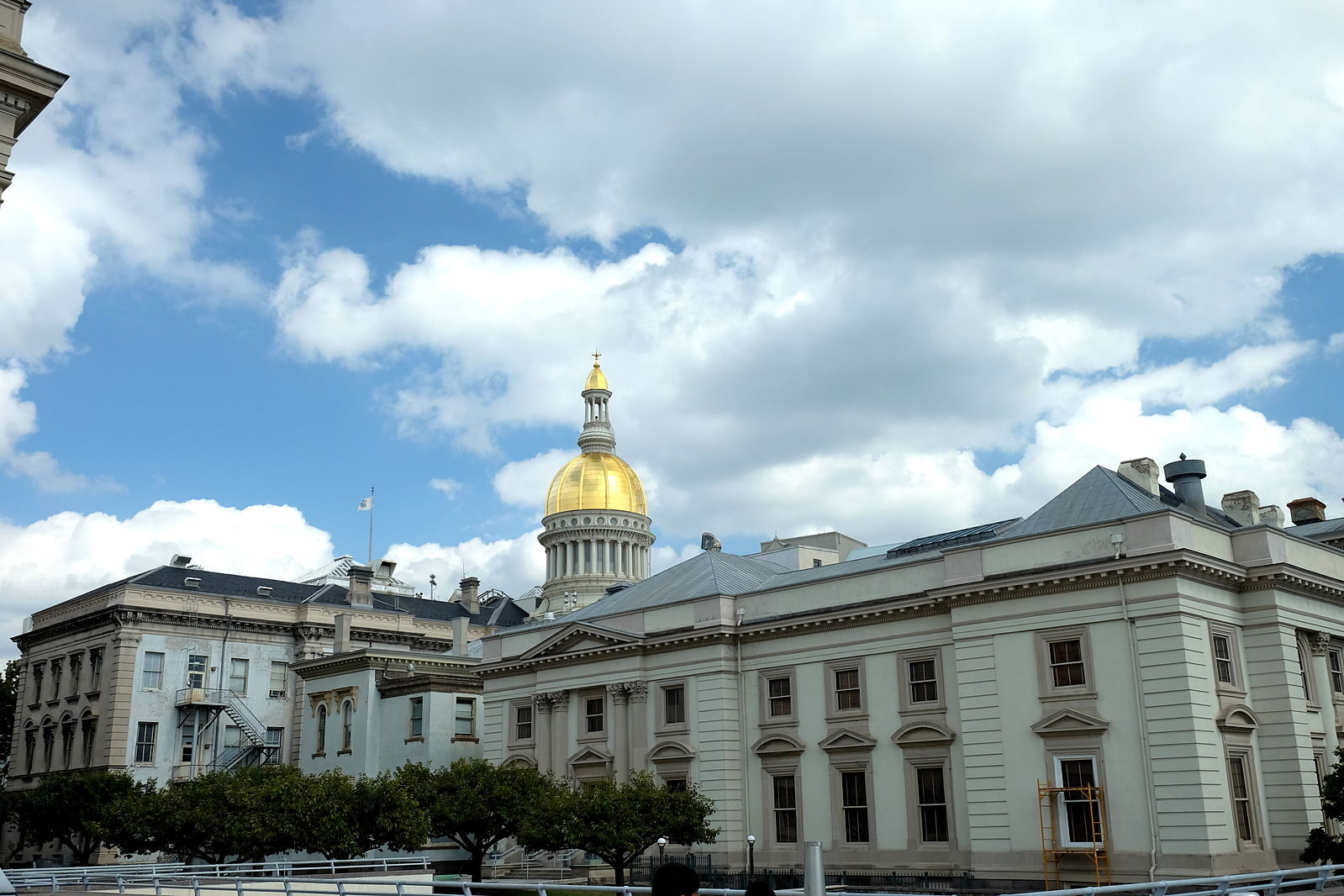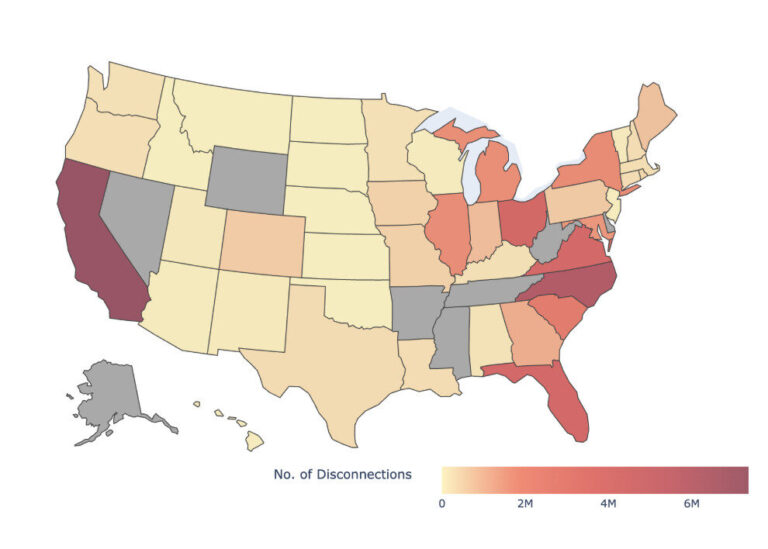Utility-funded Republican and Democratic groups try to leverage rising utility bills in New Jersey’s race for governor

Updated on October 30, 2025, with additional utility funding for the Democratic Governors Association
Investor-owned utilities and utility industry groups have made over $2.6 million in cash and in-kind contributions this year to the Republican Governors Association and Democratic Governors Association, amid an election cycle where both groups have tried to make political hay out of rising electricity bills in New Jersey’s race for governor.
The Republican Governors Association raked in over $1.2 million in support from the utility industry before launching an ad campaign attacking Mikie Sherrill on utility bills
The RGA is behind a multi-million dollar ad campaign in New Jersey that misleadingly accuses Democratic candidate for governor Mikie Sherrill of supporting an energy plan that’s caused electricity bills to triple. The Republican group has reported receiving over $1.2 million in monetary and in-kind contributions from the utility industry this year. As a 527 poltical organization registered with the IRS, the RGA is allowed to raise unlimited money from corporations, and received over $35 million from the utility industry between 2008 and 2024.
Last month, the RGA announced it was supporting a newly formed independent expenditure committee called Restore New Jersey. The committee is chaired by Daniel Scarpinato, a RGA consultant whose firm Winged Victory is based in Phoenix, Arizona.
Restore New Jersey disclosed that it received $6.25 million in September from the RGA in a report filed this month with the New Jersey Election Law Enforcement Commission.
The RGA reported contributions it received during the first six months of this year in an August report to the IRS. The Energy and Policy Institute reviewed the RGA’s mid-year report, and EPI identified $762,500 in monetary contributions and $439,499 in in-kind contributions from the utility industry.
The contributions included $100,000 from PSE&G, New Jersey’s largest electric and gas utility. In August, PSE&G reported over $1.1 billion in profits for the first half of this year. Ralph Larossa, the CEO of PSE&G, benefited from a $13.6 million compensation package last year.
The RGA received $300,000 this year from Vistra Corp., while Avangrid and Dominion Energy each gave $100,000. NextEra also contributed $75,000, and the Oklahoma-based OGE Energy kicked in $52,500. The American Gas Association contributed another $25,000, and the RGA received two smaller $5,000 contributions from AES and the Northwestern Energy Montana Employee PAC.
The Edison Electric Institute, the industry association for investor-owned electric utilities, made an in-kind contribution valued at $410,036 to the RGA on January 20. RGA and EEI co-hosted a “Donald Trump Inaugural Parade Watch Party” on that same day at EEI’s headquarters in Washington, D.C., according to an invite obtained by the watchdog group Documented.
Southern Company also made a $29,463 in-kind contribution associated with an event to RGA on June 17.
Restore New Jersey has supported Republican candidate for governor Jack Ciattarelli by spending $7.25 million on TV and digital ads attacking Sherrill. The committee’s ads have appeared on Facebook and racked up millions of views on YouTube.
As NJ.com reported, Restore New Jersey’s ads twist statements Sherrill made on a podcast where she acknowledged Democrats need to do a better job explaining how clean energy sources like solar have become cheaper than fossil fuels, and a viable way to “drive down utility costs.”
Restore New Jersey’s attack ads selectively edit out that context to make it sound like Sherrill said that clean power is “gonna cost you an arm and a leg, but if you’re a good person you’ll do it.”
Sherrill has campaigned on a promise to freeze utility rates by declaring a state of emergency on utility costs on her first day as New Jersey’s governor. Sherrill has also pledged to appoint regulators to the New Jersey Board of Public Utilities who will scrutinize how utilities spend customer money collected through utility bills, and to prioritize cheaper and cleaner energy.
Ciattarelli wants to ban offshore wind power from the New Jersey coast and withdraw New Jersey from the Regional Greenhouse Gas Initiative, a multi-state program that’s reduced harmful power sector emissions and generated funding for state energy efficiency and clean energy programs that help lower electricity bills.
PSE&G responded to Sherrill’s proposed freeze on utility rates by supporting a statement released by the New Jersey Utility Association, which blamed rising electricity bills on the regional power grid operator, PJM.
“We share New Jersey residents’ frustration with the significant bill increases from higher energy supply costs,” the NJUA statement said. “It’s important to remember that New Jersey electric companies don’t control or earn any profit from electric supply prices.”
“Electric supply cost increases and subsequent customer bill increases are driven by higher PJM capacity prices caused by declining power generation and exponentially increasing energy demand,” the statement also said.
PSE&G Power, an affiliate of PSE&G’s regulated electric utility in New Jersey, owns nuclear power plants that participate in PJM’s capacity auctions. PSE&G Power and Vistra have both benefited financially as the clearing price for PJM’s capacity auctions has increased from tens to hundreds of dollars per megawatt-day over the last several years.
In August, PSE&G announced $585 million in company-wide profits in its earnings release for the second quarter of this year. PSE&G Power’s share of the quarterly profits increased to $253 million, up from $132 million during the same quarter last year.
Sherrill blames PJM’s refusal to quickly connect new clean energy sources to the grid to help meet rising electricity demand for forcing New Jersey families to pay $400 more per year for electricity.
“I’ll take them on and beat them, because we have to lower utility bills right now,” Sherrill has said of PJM.
Ciattarelli told Fox News last month that the increase in electricity rates has helped his campaign. He blames the clean energy policies of New Jersey’s current Governor Phil Murphy, a Democrat, for closing six coal and nuclear plants in New Jersey, but a Politico fact check found most of those plants actually closed during the tenure of former Republican Governor Chris Christie. Two coal plants that closed during Murphy’s tenure are being converted to battery storage facilities for electricity.
Restore New Jersey’s ads echo Ciattarelli’s misleading claim, accusing Sherrill of supporting a “failed energy plan that shut down power plants to build offshore windmills. The result – New Jersey’s electric bills tripled this summer…after double-digit rate hikes.”
The Democratic Governors Association raised over $1.4 million from the utility industry and blames rising electric bills on Republicans
Another independent expenditure committee named Greater Garden State has been backed by nearly $10 million from the Democratic Governors Association this year, but has steered clear of the topic of utility bills in its ads opposing Ciattarelli.
The DGA has promoted Sherrill’s plan to freeze utility rates and described the Democrat as the candidate who will tackle rising utility bills. It’s also panned Ciattarelli for supporting President Trump’s One Big Beautiful Bill, which the DGA said is “causing energy bills to skyrocket.”
Energy Innovation estimates that household energy costs will increase by $220 annually by 2035 under One Big Big Beautiful Bill.
The Energy and Policy Institute reviewed the DGA’s report to the IRS for the first half of this year and identified $1,433,300 in contributions from the utility industry. The Democratic 527 group received $26 million from the utility industry between 2008 and 2024.
PSE&G contributed $125,000 to the DGA, more than it gave to the RGA.
The DGA also received $10,300 from Brian Tierney, the CEO of FirstEnergy, the parent company of Jersey Central Power & Light. It’s the largest reported political contribution a FirstEnergy CEO has made since the company became embroiled in a bribery and corruption investigation in Ohio in 2020.
In 2024, JCP&L agreed to refund $17.5 million to New Jersey customers who were mischarged by JCP&L for expenses related to the Ohio scandal, which resulted in customers avoiding having to pay increased rates approved by the state’s Board of Public Utilities for several months last year. The BPU made clear it intends to continue to investigate the JCP&L mischarges in an order issued this summer following a regulatory audit of JCP&L.
The BPU’s five current commissioners have all been appointed by Murphy.
“In my administration, Board of Public Utilities nominees, who hold huge power over rate hikes, will share my commitment to driving down energy costs above all else,” Sherrill has said in campaign materials. “If they don’t, they shouldn’t get too comfortable.”
Sherrill has pledged to open up the books of PSE&G, Jersey Central Power & Light, and other New Jersey utilities “to see where rising costs to families are going…”
Ciattarelli has promised to “immediately reform the NJ Board of Public Utilities, freeing it from control of the utility monopolies that consistently raise gas and electricity rates…”
Avangrid was the DGA’s largest utility donor, with $275,000 in contributions so far this year, followed by Vistra with $250,000. Dominion Energy contributed $200,000. The DGA also received $150,000 from Southern Company, $100,000 from American Electric Power, $70,000 from NiSource, $63,000 from NextEra, and $50,000 from DTE Energy.
AES contributed $30,000, and Consumers Energy, Xcel, and the American Gas Association each gave $25,000. Constellation Energy contributed $20,000, while NRG Energy kicked in $15,000 and PacifiCorp gave $10,000.
Photo of the New Jersey State House by Lowlova from WikiMedia Commons. Creative Commons Attribution-Share Alike 4.0 International.



